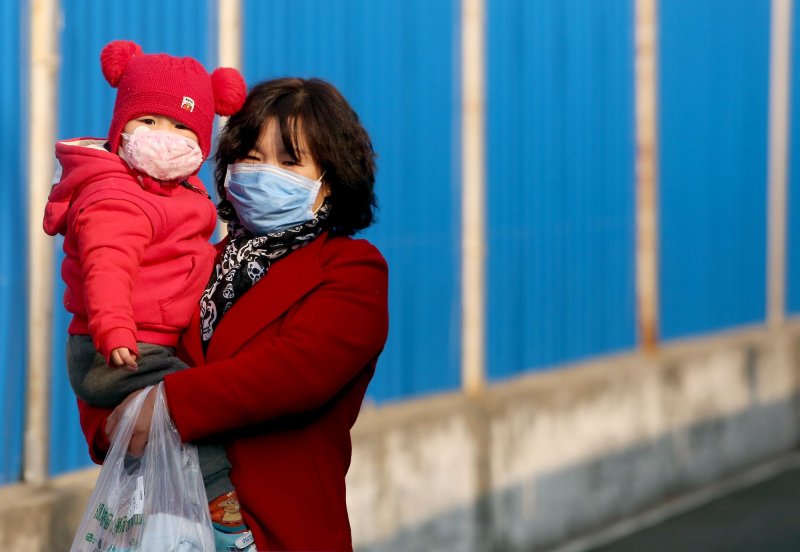A mother carries her daughter on an empty street in Beijing on Monday. Photo by Stephen Shaver/UPI |
License Photo
Feb. 25 (UPI) -- Chinese health officials on Tuesday reported 71 deaths from the coronavirus over the day prior, the lowest number it has recorded in a 24-hour period since early this month when daily death tolls were on the rise.
The new figures increased the death toll for mainland China since the disease emerged in Wuhan city in December to 2,663 though it is a continuation of a downward trend and is the fewest deaths recorded in a day since 73 people died over Feb. 5.
China's National Health Commission also confirmed 530 new cases of COVID-19 over the day previous, with Hubei province, home to Wuhan, accounting for 499 of them.
At a press briefing Tuesday, the head of the World Health Organization's international coronavirus team, which released its report on China on Monday, said that China's systematic response to the outbreak helped mobilize "a phenomenal collective action" that included a high level of cooperation from the general population.
"They used standard, old-fashioned public health tools and applied these with a rigor and innovation of approach on a scale that we've never seen before," said Bruce Aylward, an epidemiologist from Canada, who was the leader of WHO's 25-member team traveling to China last week.
He said China has taken case findings, contact duration, social distancing, movement restriction and used that approach to try to track -- and stop -- the emergent respiratory pathogen.
"Everyone has a role and it has been repurposed to fit into this machinery, and it works through a prevention and control task force that answers to the state council and president," Aylward said. "It's a technologically turbocharged response. They are using big data and AI in places, and they've had to manage massive amounts of data and map huge numbers of contacts."
However, as the virus appears to be stabilizing in China, countries worldwide are attempting to combat new outbreaks.
WHO reported that there were 80,239 confirmed cases of the virus worldwide, including 2,459 confirmed cases in 33 countries throughout China.
Neighboring South Korea reported an additional 214 confirmed cases of the disease from the day prior, increasing its total to 977, more than double any other country aside for China.
Of those infected, 56 percent are associated with the Shincheonji Church of Jesus, a secretive and controversial church where a 61-year-old woman considered to be a so-called super-spreader attended services before exhibiting symptoms. A second cluster of around 13 percent is connected to a hospital in nearby Cheongdo.
It also reported two more deaths, increasing its death toll to 10.
Italy has reported the third-highest number of confirmed infections with 229 and at least six deaths, according to its Ministry of Health, with 172 infections recorded in the Lombardy region, where Milan is located, and 33 in Veneto, which is home to the port city of Venice.
Officials said two Chinese tourists were confirmed as Italy's first cases of infection on Jan. 30. Its third case, that of national who had visited Wuhan, was confirmed Feb. 6.
WHO said in a statement Monday that a team arrived in Italy with health experts from the European Center for Disease Prevention and Control to support local officials amid the expanding clusters in northern Italy.
The organization said it expected person-to-person transmission of the virus outside of China but the rate at which it is spreading in the southern European country over the past two days "is of concern."
"WHO stands by the government of Italy in its efforts and commitment to mitigate this outbreak and manage the cases effectively," said Dr. Hans Kluge, WHO regional director for Europe. "Now is the time for solidarity and cooperation, to work together to protect everyone's health."
Japan, which has the fourth-highest number of infections with 157, said Tuesday it has decided on measures to protect its outbreak from worsening, including calling on people exhibiting symptoms of the virus or cold to stay home from work and school while encouraging businesses to promote teleworking, Japanese broadcaster NHK reported.
In the Middle East, four new countries including Afghanistan, Bahrain, Iraq and Ohman have reported cases this week.
A day after recording its first two cases, Bahrain on Tuesday registered six more in the kingdom.
The Bahrain Ministry of Health said the two Bahraini citizens and four Saudi nationals arrived in the kingdom by plane from Dubai and were examined as part of precautionary measures at Bahrain international airport, Bahrain News Agency reported.
The new patients arrived in the Middle Eastern country prior to the Civil Aviation Affairs' 48-hour suspension of flights from Dubai International Airport and Sharjah International Airport went into effect.
In Kuwait, hours after it reported its first three infections, it added five more for a total of eight.
Its Ministry of Health announced the new cases Monday night, stating the two female passengers had been aboard the same airplane the first three cases were on that had departed from Iran.
The country has since suspended all flights with South Korea, Thailand and Italy due to COVID-19. The Directorate General of Civil Aviation said in a press statement carried by the nation's news agency that it made the order based on the Health Ministry's advice, adding all non-citizens who have visited either of those countries two weeks prior to arriving at Kuwait will be denied entry, even if they have valid visas.















